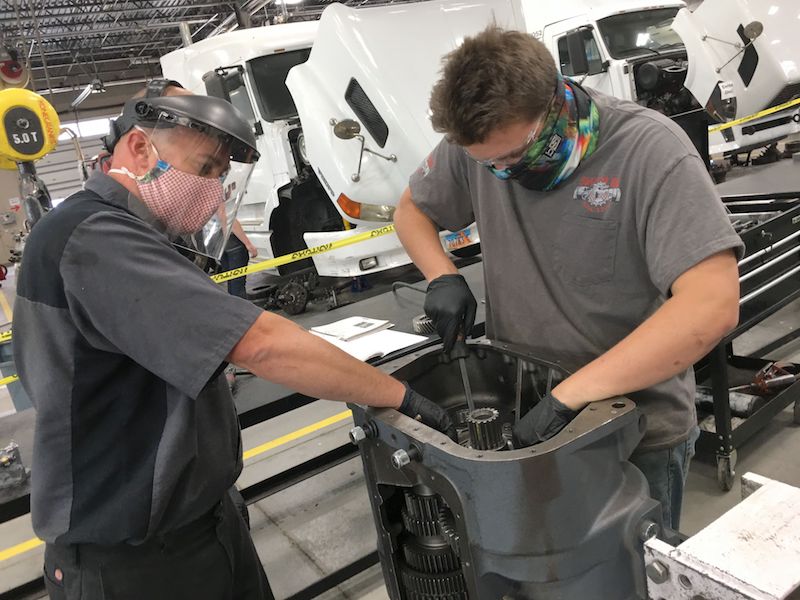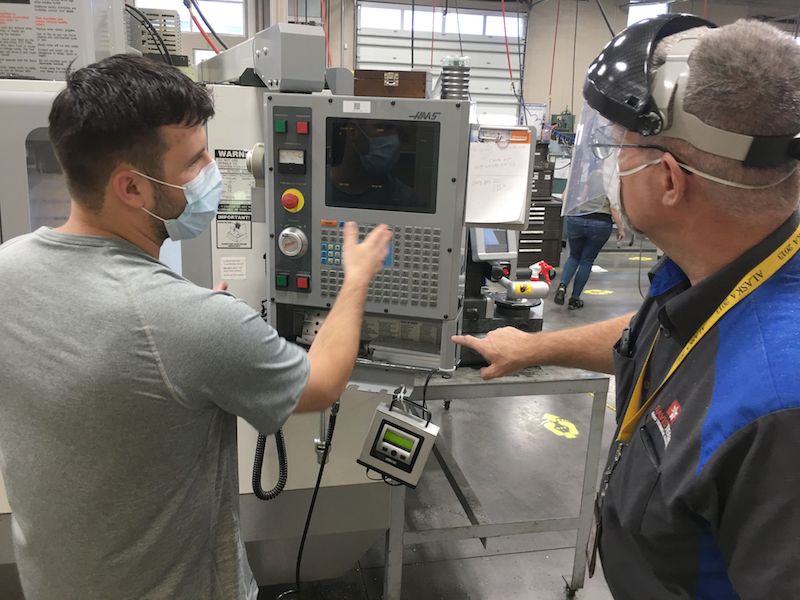
Trade schools balance need to train in-demand skilled works with pandemic restrictions
Nicholas Labrum had already made a career change when the Covid-19 pandemic sent him searching for yet another option. Labrum had a degree from Utah State University in Sociology and had worked as a social worker with troubled teens before changing direction and going to to work for the aerospace manufacturing company Williams International in Ogden.
“I had only been working there for about three months when Covid hit,” he said. “We all thought as a defense contractor we would be considered essential and keep working.
He said workers were even given letters from the company stating as such so they could keep working during the early days of the Covid-19 restrictions.,“But it wasn’t too long after that they started laying people off. I just thought, ‘what am I going to do now?’”
Knowing of his love for computers and technology, Labrum said his sister suggested looking at Information Technology programs and with her help he enrolled in a program at Davis Technical College in Kaysville.
Labrum is just one of many who either found themselves furloughed or just unemployed due to the Covid-19 pandemic. While some waited for their jobs to restart others saw it as an opportunity.
Utah schools scrambled to find ways to accommodate students enrolled in high-demand, skilled professions, as well as others taking advantage of the unexpected time off to explore new skills or careers.
“We’ve really had to figure out ways to help people be successful,” said Winn Stanger, director of career services at Weber State University. “Before the Covid-19 restrictions, our programs were about 80 percent in person and 20 percent on-line, and now that has completely changed. We are pretty much 100 percent online.” Stanger said Weber State’s continuing education programs and Learn and Work programs have a large number of students who are already in career fields but need more skills to advance or change paths.
Weber State, like other higher education institutions in Utah, received emergency funding from the Coronavirus Aid, Relief and Economic Security Act (CARES) to use for a variety of issues related to keeping educational courses available to students.
WSU received $5.8 million with more than half going to emergency financial aid grants for students. James Taylor, director for the Office of Special Projects and Technology Commercialization, also oversees training in the school’s Work and Learn Program that provides certified training courses for students.
“Our program got $1.9 million and we were able to create 16 different programs that provide competency-based skills training that make people more employable,” Taylor said. “We have 1,239 students enrolled. Most of the funding went to tuition. We also made courses available online. Because it is competency based, they can jump in any time during the semester and get started.”

Melanie Hall, director of marketing and community relations at Davis Technical College in Kaysville said that the adjustment has been more challenging for technical colleges providing“hands-on” and in-person training in skills like welding, auto repair and plumbing.
“We’ve been open since May and we’ve had to limit the numbers in classrooms at any time,” she said. “We require masks on campus, and since November 20, we’ve been testing asymptomatic students every two weeks. We’ve had very few positive tests.”
Hall said the restrictions have slowed the progress of students in several programs, but the demand for skilled workers in the 35 different programs offered by Davis has remained high, especially for people trained in working with composite materials — another program offered by the school.
“It is a huge industry with Hill Air Force Base here, and with the contracts they have with Northrup Grumman and Boeing, there is a massive demand for those workers,” Hall said.
Hall said that Davis Tech, like other secondary educational institutions, received funds though,the state to support students needing laptops and other unexpected expenses related to Covid-19 restrictions. “We have a student in our pharmacy technology program who is a recent widow with six children. We were able to help her and get her through the program.”
The story is much the same at Ogden-Weber Technical College, according to Maria Milligan, the school’s marketing manager. “Though enrollment did go down a bit with COVID, we’ve found that demand for our programs and the career paths they enable is still high” she said.
Ogden-Weber received about $300,000 in CARES Act funding which Milligan said went primarily to grants for students who needed emergency help to continue their studies as well as provide laptops and other remote learning technology for students.
“Our instructors worked quickly to create blended learning models. They moved whatever coursework they could online and then scheduled in-person lab time to accommodate student needs. Technical education is inherently hands-on, so we have worked to keep in-person learning going as much as possible, while keeping students and faculty safe,” said Milligan.
Hall said during the pandemic, financial aid officials at technical colleges have been given greater leeway to work with students and get them the financial help to pursue training.
“If you’ve gotten financial aid in the past or think you don’t qualify you should still talk to us because there are lots of options out there most people don’t know about and funds are just unused,” said Hall.
As for Labrum, he is continuing in the Information Technology program at Davis Tech and is planning to earn additional certifications in cyber-security. Last year he was among the top five finalists for “Student of the Year” honors and received a scholarship. He has increased his course load and is looking forward to graduating before the end of this year.
Subscribe to Utah Stories weekly newsletter and get our stories directly to your inbox





